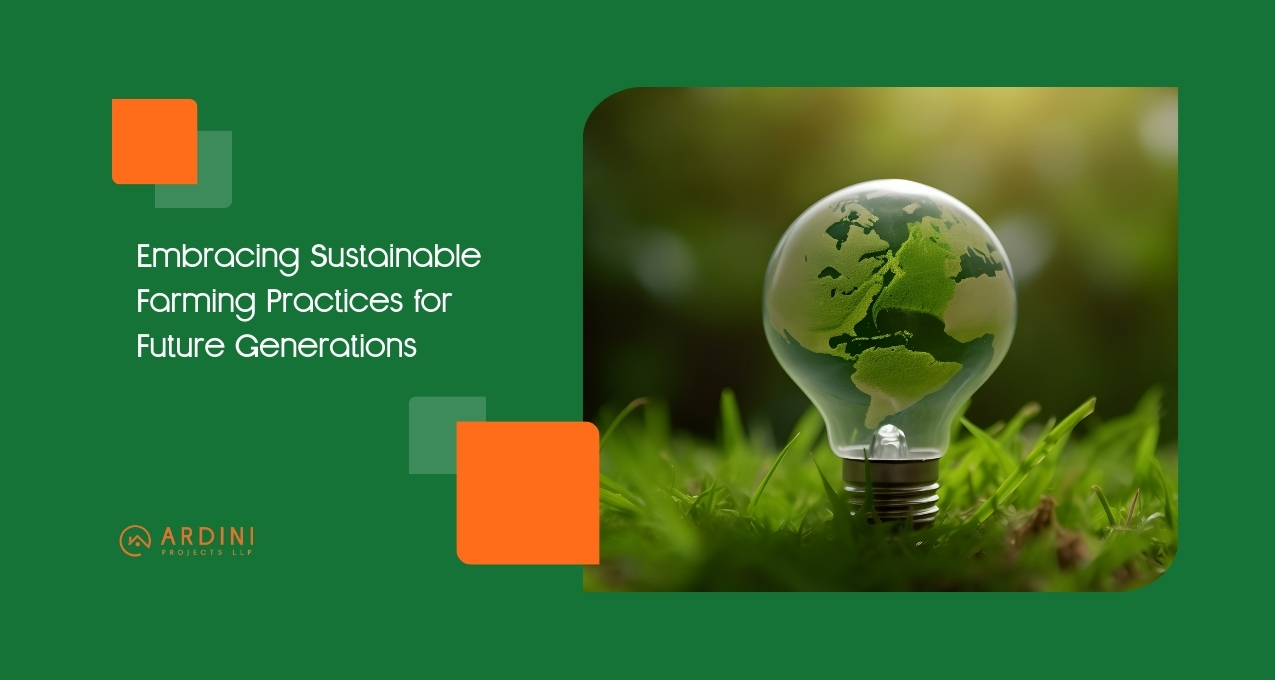Embracing Sustainable Farming Techniques for Future Generations

In our fast-paced world, where concrete jungles often overshadow green fields, sustainable farming techniques have become increasingly vital. Sustainable farming techniques ensure that the way we grow our food today doesn't harm the ability of future generations to do the same. Nestled amidst nature near the tranquil Gollapalli Reservoir, Ecowood Habitat by Ardini Projects LLP is a testament to sustainable living and modern comfort. This gated community in Bangalore invites you to embark on a journey towards a greener future, intertwining nature's bounty with progressive practices. Nestled amidst nature near the tranquil Gollapalli Reservoir, Ecowood Habitat by Ardini Projects LLP is a testament to sustainable living and modern comfort. This gated community in Bangalore invites you to embark on a journey towards a greener future, intertwining nature's bounty with progressive practices.
What Are Sustainable Farming Techniques?
Sustainable farming techniques encompass a range of methods aimed at reducing the environmental impact of agriculture while maintaining productivity and profitability. These techniques focus on preserving natural resources, enhancing soil fertility, and promoting biodiversity. They include practices like crop rotation, agroforestry, organic farming, integrated pest management, and water conservation.
- Crop Rotation: Rotating crops helps maintain soil health by balancing nutrients and reducing soil erosion. It also prevents the buildup of pests and diseases that can occur with monoculture.
- Agroforestry: Integrating trees and shrubs into agricultural land can enhance biodiversity, improve soil structure, and provide additional income through timber or fruit.
- Organic Farming: Avoiding synthetic chemicals and fertilizers, organic farming relies on natural processes to enhance soil fertility and control pests, making it a cornerstone of sustainable farming techniques.
- Integrated Pest Management (IPM): IPM combines biological, cultural, and mechanical methods to control pests, reducing the need for chemical pesticides and promoting a healthier ecosystem.
Water Conservation: Techniques like drip irrigation, rainwater harvesting, and the use of drought-resistant crop varieties help conserve water and ensure its sustainable use.
The Importance of Sustainable Farming Techniques
Sustainable farming techniques are essential for several reasons. They help preserve the environment, enhance food security, and improve the livelihoods of farmers. By adopting these practices, we can ensure that future generations inherit a planet capable of sustaining life and providing for their needs.
- Environmental Preservation: Traditional farming practices can lead to soil degradation, water pollution, and loss of biodiversity. Sustainable farming techniques mitigate these effects by promoting soil health, reducing chemical use, and conserving water resources.
- Food Security: With the global population expected to reach 9.7 billion by 2050, ensuring a stable food supply is crucial. Sustainable farming techniques increase resilience to climate change and reduce dependency on external inputs, making food production more reliable.
- Economic Benefits: Sustainable farming techniques can improve farmers’ income by reducing input costs and enhancing crop yields. Practices like agroforestry and organic farming can also open new markets and provide additional revenue streams.
- Social Impact: By promoting community-based approaches and knowledge sharing, sustainable farming techniques foster stronger, more resilient communities. They also support gender equality by involving women in decision-making and farm management.
Ecowood Habitat: A Model of Sustainable Farming Techniques
Ecowood Habitat by Ardini Projects LLP embodies the principles of sustainable farming techniques. This community near the Gollapalli Reservoir is designed to harmonize with nature, offering residents a lifestyle that balances modern comfort with ecological responsibility.
- Community Organic Farms: Residents can engage in organic farming, growing their own fruits and vegetables without synthetic chemicals. This promotes health, reduces carbon footprints, and fosters a connection with nature.
- Water Management: Ecowood Habitat employs advanced water conservation techniques, including rainwater harvesting and efficient irrigation systems, ensuring sustainable water use and preserving this precious resource.
- Biodiversity Conservation: The community’s landscaping includes native plants and trees, enhancing biodiversity and providing habitats for local wildlife. Agroforestry practices are also integrated, promoting a balanced ecosystem.
- Renewable Energy: Solar panels and other renewable energy sources are used to reduce reliance on fossil fuels, decreasing the community’s carbon footprint and promoting energy independence.
- Waste Management: Comprehensive waste management systems, including composting and recycling, minimize waste and promote a circular economy. This reduces environmental impact and supports sustainable living.
How to Implement Sustainable Farming Techniques
Adopting sustainable farming techniques requires knowledge, planning, and a commitment to continuous improvement. Here are some steps to help farmers and communities transition to more sustainable practices:
- Education and Training: Learning about sustainable farming techniques is the first step. Farmers can attend workshops, read books, and consult experts to gain the necessary knowledge and skills.
- Soil Testing and Management: Understanding soil health is crucial for sustainable farming. Regular soil testing helps identify nutrient deficiencies and informs decisions about crop rotation, composting, and other soil management practices.
- Water Conservation: Implementing efficient irrigation systems, such as drip irrigation, and practices like mulching and rainwater harvesting can significantly reduce water use and improve crop yields.
- Pest and Disease Management: Adopting integrated pest management practices, such as biological control and crop rotation, helps control pests and diseases without relying on harmful chemicals.
- Diversification: Diversifying crops and livestock can improve resilience to market fluctuations and environmental changes. Agroforestry, polyculture, and intercropping are effective diversification strategies.
- Community Engagement: Collaborating with other farmers, local organizations, and government agencies can provide support, resources, and opportunities for knowledge sharing. Community-based approaches are often more successful and sustainable.
Challenges and Solutions in Sustainable Farming
Implementing sustainable farming techniques can be challenging, but the benefits far outweigh the difficulties. Here are some common challenges and potential solutions:
- Initial Costs: Transitioning to sustainable practices may require an initial investment in new equipment, seeds, and training. Governments and organizations can provide financial support through grants, subsidies, and low-interest loans.
- Knowledge Gaps: Lack of knowledge and technical skills can hinder adoption. Extension services, farmer field schools, and online resources can bridge this gap by providing education and training.
- Market Access: Farmers may struggle to find markets for sustainably produced products. Developing local markets, forming cooperatives, and participating in certification programs can improve market access and increase profitability.
- Policy Support: Supportive policies and regulations are essential for promoting sustainable farming techniques. Advocating for favorable policies and participating in policy-making processes can help create an enabling environment.
The Future of Sustainable Farming Techniques
The future of sustainable farming techniques is promising, with advancements in technology, increasing awareness, and growing support from governments and organizations. Innovations such as precision agriculture, vertical farming, and regenerative agriculture are transforming the way we grow food, making it more sustainable and efficient.
- Precision Agriculture: Using data and technology to optimize farming practices, precision agriculture reduces waste, improves efficiency, and enhances productivity. Tools like GPS-guided tractors, drones, and sensors provide real-time data on soil health, weather, and crop conditions.
- Vertical Farming: Growing crops in vertically stacked layers, vertical farming maximizes space and resource use. This technique is particularly useful in urban areas, reducing the need for transportation and minimizing environmental impact.
- Regenerative Agriculture: Focusing on restoring and enhancing soil health, regenerative agriculture practices include cover cropping, reduced tillage, and composting. These practices improve soil fertility, increase biodiversity, and sequester carbon, contributing to climate change mitigation.
- Blockchain and Transparency: Blockchain technology can enhance transparency and traceability in the food supply chain, ensuring that sustainably produced products are accurately labeled and rewarded. This can build consumer trust and support sustainable farming practices.
- Climate-Smart Agriculture: Integrating climate change adaptation and mitigation strategies into farming practices, climate-smart agriculture aims to increase resilience and reduce greenhouse gas emissions. This includes practices like agroforestry, conservation agriculture, and improved livestock management.
Conclusion
In conclusion, sustainable farming practices are not an option but a responsibility towards our planet and future generations. For this purpose, Ecowood Habitat by Ardini Projects LLP stands as a beacon, embodying the principles of sustainable living in the lap of nature. Take the leap towards investing in agricultural land that enriches your life and contributes to a greener, more sustainable tomorrow.
- Tags : Managed Farming, Sustainable Farming
